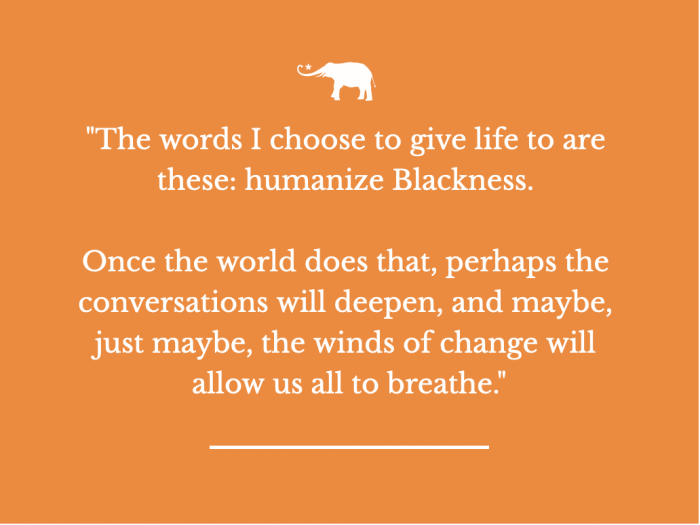There is an inexplicable unity in Blackness.
We feel injustice intimately with one another, perhaps because we understand that none of us are immune from the insidious tentacles of racial bias.
There is no amount of education, money, “living right,” or diverse friendship circles that provide a safe haven from the heart disease of racism. Black folks are not a monolith, but we are treated as such in our day-to-day lives by those who lack the capacity to see the complexities of our existence.
Unfortunately, the inability to see the humanity of Black men and women shines brightest in this country’s most important systems.
We have watched helplessly and hopelessly as our fathers, sons, brothers, and cousins have been imprisoned at dizzying rates, with inequitable sentencing for the same crimes compared to their white counterparts for decades. And every time we learn of the latest police shooting, collectively, we are deeply triggered.
The killing of unarmed Black men and women by its police forces has yet to cease in America, and the emotional exhaustion of Black Americans is crippling. We vacillate between viewing the aftermath of mass shootings, predominately committed by white men, and witnessing Black body after Black body lying lifeless at the feet of white men (and women) entrusted with the protection of our communities.
Law enforcement and the American judicial system as a whole fails people of color every single day. These failures are not limited to the most egregious acts we see in the news or the loudening conversations of other immensely important reform calls tethered to the judicial system, such as those for the cash bail system. These failures also include microaggressions aimed at the very core of the human psyche. Microaggressions within these systems are perpetrated by individuals who work in some of the lower levels but with the ability to have huge impacts on human life. That microaggression—which, if you think about it, isn’t really “micro” at all—is that of the indifference to the humanity in those convicted of crimes in general and, more specifically, people of color within these systems.
Individuals who work in the lesser-known departments of administrative offices can inflict harm that—on the surface—seems insignificant but can cause added trauma to the experience of those living in or dealing with the system. Administrative errors and oversights happen in any line of work. Human error exists. It is when one works within a system meant to encourage safety, order, and rehabilitation, that the level of care and accountability should be second to none. That is not what people cycled through the American criminal justice system are regularly met with.
The reality is that America’s criminals, from petty to violent, incarcerated or released, are thrown away and processed as names on paperwork outlining the details of their crimes. Unless personally touched by it or moved to become involved in it, the average person does not get to see the humanity stripped away from not only those who have committed crimes but that of those who manage those systems.
Back in 2017, I remember watching Terrance Crutcher’s family on the national news affirming his humanity, and I can recall how much it enraged me. I angrily went to Facebook to document my disgust. I hoped that those who disregarded this man’s life never had to sit on television and plead with the general population to see their loved one as a human being. The idea that his family sat on national television, amid their profound grief, to remind people that he, too, had dreams, goals, and children—that he was loved—was incredibly infuriating to me.
Four years after watching Terrance Crutcher’s family on television pleading for their loved one’s humanity, I found myself in an adjacent experience with the Indiana Department of Corrections. My nephew has been imprisoned at the Miami Correctional facility in Indiana for the last six years for a crime he committed. For the last five months, the prison had given him a release date that has come and gone, and he is not home. One could only imagine the trauma my sister and I experienced when we received a call four days before his scheduled departure that a mistake was made in the computation of his sentence and that he would not be released to us.
To add insult to injury, my sister had the task, more than 24 hours after her notification, of informing my nephew that he would not be coming home as expected. I watched her tearfully, and with my stomach turning, deliver the overwhelmingly difficult news to him. His counselor, nor a single person in a position to do so at the prison, ever informed him of his fate. The gut-wrenching continued for three more full days. My sister and I traveled to the prison for answers, called no less than five prison employees, and left messages for them all. To date, no one has ever returned our calls.
Please sit with this for a moment.
Not only did the prison system fumble its administrative duties to the person they have been tasked to reform, but it also placed the burden of that notification on the backs of his loved ones struggling with their grief. I marvelled at his strength in maintaining his composure after learning his fate because, after all he has seen and endured in that prison, God knows I would understand.
Indiana’s recidivism rate for males is 39.9 percent. Nationally, the rate for any type of offense is even higher. This situation caused me to think about how a system meant to rehabilitate can cause so much more harm than good. It is something like this, seemingly so innocuous, that has the potential to break a grown man.
Ultimately, it took a trip to the Indiana Department of Corrections Central office to find individuals to provide us with the answers we needed to understand how such a grievous mistake could happen. We had to endure the cold stares, stonewalling, and indifference of prison officials in order to finally reach someone who demonstrated concern for our plight. It was an extremely long and emotionally taxing day.
In the end, only two individuals, out of so many who we so desperately reached out to for help that day, were able to acknowledge our humanity and that of our loved one. I was moved to tears by their compassion.
The threat of my nephew having a psychological breakdown after learning that he was not going home was quite real. The anxiety that my sister and I endured for four long days was excruciating. Having those two individuals be the only ones to take the time to be humane was both incensing and consoling at the same time. That confuses my senses. Because this is not a happy ending. While we got our answers, it does not reverse the trauma we all experienced.
We were there to advocate on his behalf, but consider for a moment those who do not have someone to advocate for them. Or, think about those who may have someone to advocate for them, but because of someone’s biases against their Blackness, their dialect, or their perceived economic status, they are not well received by the human resources meant to assist them. Our teeny, tiny win in this particular situation is nowhere near enough to restore my faith in a horribly failed system of rehabilitation. If nothing else, it reaffirms my opinion that this system does far more harm than good to everyone it touches.
These words are not meant to condemn all of the hardworking people who perform difficult jobs within a broken system. In a sea of dysfunction and hate that threatens to drown us all, people such as those described above provide life rafts that can offer hope in the humanity of people working within these systems. I am grateful to have received some level of concern from these individuals, but it is not enough to right the wrongs carried out against inmates and ex-convicts doing the right things or the families that support and advocate for them.
Each tier of this system meant to embody “justice” is merely the collective American Beast that has fed on Black and Brown bodies since its inception. There could be thousands of words spilled over the need for criminal justice reform, but there are many voices championing that cause.
The words I choose to give life to are these: humanize Blackness.
Once the world does that, perhaps the conversations will deepen, and maybe, just maybe, the winds of change will allow us all to breathe.












Read 4 comments and reply